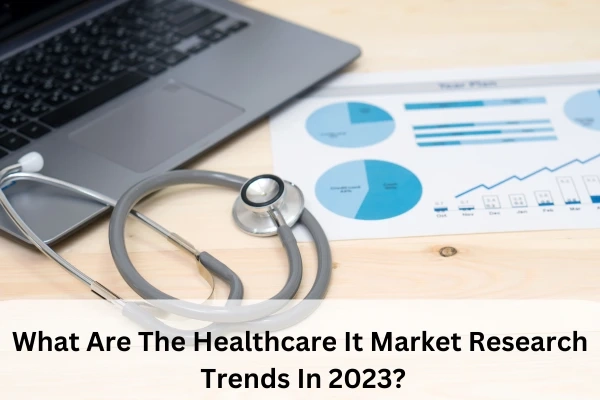The healthcare industry is undergoing rapid transformation, and technology is playing a major role in shaping its future. Healthcare IT is essential for improving patient care, streamlining operations, and driving innovation in the medical field. As we enter 2023, several trends are poised to disrupt the healthcare IT market. This article explores seven key healthcare IT market research trends to watch in 2023, providing valuable insights for industry professionals, policymakers, and investors.
1. Artificial Intelligence (AI) in Healthcare:
Artificial intelligence (AI) is transforming the healthcare sector by improving diagnostic accuracy, predicting patient outcomes, and optimizing treatment plans. In 2023, we can expect AI to become even more integrated with electronic health records (EHRs) and medical imaging systems, leading to more personalized patient care. AI-powered chatbots will also become more widespread, helping patients to engage with their care team, answer questions, and schedule appointments. This will free up healthcare staff to focus on more complex tasks, improving overall efficiency.
2. Internet of Medical Things (IoMT):
The Internet of Medical Things (IoMT) is a network of medical devices and applications that collect and share patient data. In 2023, IoMT is expected to grow significantly, driven by the development of advanced wearable devices, remote patient monitoring systems, and smart implants. These technologies will allow healthcare providers to remotely monitor patients, which can help to ensure timely interventions and reduce hospital readmissions. However, data privacy and security concerns will remain a significant challenge that needs to be addressed before IoMT can reach its full potential.
3. Blockchain Technology for Healthcare:
Blockchain technology is gaining momentum in the healthcare industry, offering the potential for secure and transparent sharing of medical data. In 2023, we expect to see increased adoption of blockchain for health data management, medical billing, and drug supply chain management. Blockchain's decentralized nature can improve data interoperability, reduce administrative costs, and protect patient data from cyberattacks.
4. Telemedicine and Virtual Care:
Telemedicine has seen a surge in popularity in recent years, thanks to the COVID-19 pandemic. This trend is expected to continue in 2023, as virtual care solutions evolve to provide a seamless and integrated healthcare experience for patients. Video consultations, remote monitoring, and digital health platforms will all play a role in this evolution.
Healthcare providers will also invest more in telemedicine infrastructure to improve access to healthcare services, especially in remote areas. This will help to reduce the burden on physical healthcare facilities and make it easier for patients to receive the care they need.
5. Data Analytics and Predictive Insights:
The vast amount of healthcare data available today provides a unique opportunity to improve patient outcomes. In 2023, data analytics and predictive modeling will be essential for understanding population health trends, identifying high-risk patients, and optimizing resource allocation. Healthcare organizations will increasingly use big data analytics to make informed decisions, improve patient care protocols, and manage population health more effectively.
6. Cybersecurity in Healthcare:
The digitization of healthcare services and the increasing use of connected devices are making healthcare organizations more vulnerable to cyberattacks. In 2023, cybersecurity will be a top priority for healthcare organizations, and significant investments will be made to protect patient data and medical systems. Advanced encryption techniques, multi-factor authentication, and AI-driven threat detection will be used to bolster security measures.
The healthcare industry relies heavily on technology to manage patient records, conduct medical research, and provide cutting-edge treatments. As a result, healthcare organizations are a prime target for cyberattacks. In 2023, healthcare organizations will need to take a proactive approach to cybersecurity to protect patient data and ensure the continuity of care.
7. Augmented and Virtual Reality in Medical Training:
In 2023, augmented reality (AR) and virtual reality (VR) will be increasingly used in medical training and education. These technologies will allow medical students and healthcare professionals to practice surgeries, diagnose patients, and learn about complex medical procedures in a risk-free virtual environment. This will improve the quality of medical training and lead to better patient outcomes.



